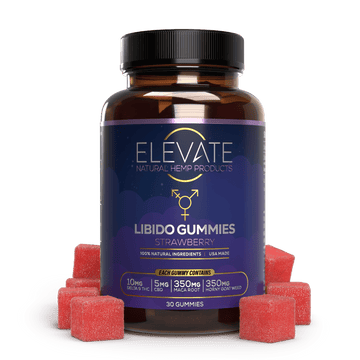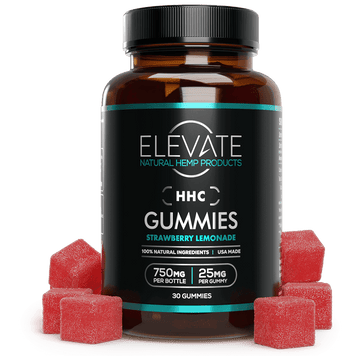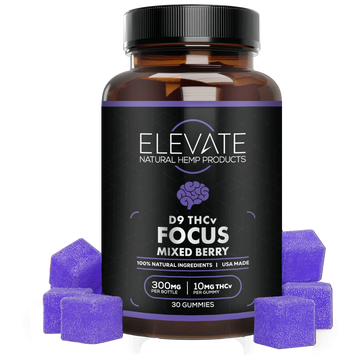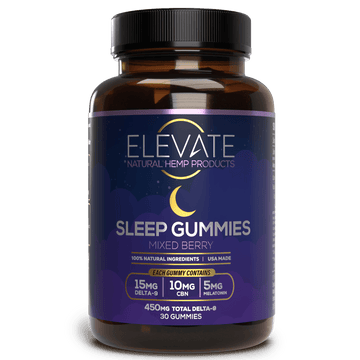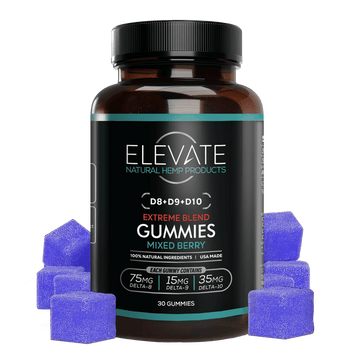When you see a product labeled with Delta 9 THC, your first thought might be of marijuana. But the cannabis world is more nuanced now. Thanks to federal law, you can find legal, hemp-derived Delta 9 products available nationwide. The critical difference lies in the concentration. This legal distinction is everything, but it can also be a source of confusion. We're here to clear things up. We’ll explain exactly how much THC is in legal hemp products, how that compares to marijuana, and what this all means for your experience.
At Elevate, we will unveil the mysteries, starting from its origins and applications, and journeying through its varying concentrations, the significance of these levels, and where you can find this intriguing cannabinoid.
What Is Delta 9 THC?
Delta 9 THC is a prominent and well-known cannabinoid found in cannabis plants, belonging to the class of compounds known as tetrahydrocannabinol. It’s the primary psychoactive compound responsible for the”high” associated with marijuana consumption.
It interacts with the endocannabinoid system in the human body, primarily binding to CB1 receptors in the brain. This interaction results in various psychoactive effects, such as altered perception, relaxation, and euphoria.
How Delta 9 Works
Ever wonder what’s happening inside your body after you take a Delta 9 gummy? It’s not magic, it’s science. Your body has a complex network called the endocannabinoid system, or ECS for short. Think of the ECS as your body's internal balancing act, helping to manage important functions like your mood, sleep patterns, appetite, and even how you perceive pain. It works through a system of receptors found all over your body, especially in your brain. Delta 9 THC has a molecular structure that allows it to connect with these receptors, temporarily influencing the messages they send. This unique interaction is the foundation of how Delta 9 produces its well-known effects, from a sense of deep relaxation to a brighter outlook.
Interaction with Brain Receptors and Dopamine
So, how does Delta 9 actually create that classic 'high' feeling? It all comes down to its relationship with specific receptors in your brain, mainly the CB1 receptors. When you consume Delta 9, it travels to your brain and binds to these receptors, kind of like a key fitting into a lock. This connection triggers a chain reaction, and one of the most significant results is the release of dopamine. You’ve probably heard of dopamine—it’s the neurotransmitter associated with pleasure and reward. According to Healthline, this dopamine surge is what makes you feel good, contributing to the sense of euphoria and calm that many people experience. This interaction is a key area of scientific discussion, as it directly influences everything from mood to pain perception, allowing products like our Delta 9 Gummies to offer a consistent and enjoyable experience.
Applications of Delta 9 THC
You might wonder why Delta 9 THC has become the talk of the town. It’s not just about getting high; it’s about exploring the vast spectrum of effects, both medical and recreational. So, let’s discuss its potential applications:
Pain Management
Delta 9 THC has shown promise in providing relief from chronic pain, such as neuropathic pain, making it a potential alternative for those who may not find relief from traditional painkillers.
Appetite Stimulation
It’s been widely recognized for its ability to stimulate appetite, particularly in individuals experiencing appetite loss due to medical conditions or treatments like chemotherapy.
Nausea and Vomiting Control
Delta 9 THC has been used to alleviate nausea and vomiting in patients undergoing chemotherapy, AIDS treatment, or dealing with severe gastrointestinal disorders.
Neurological Disorders
Delta 9 THC might have a role in managing symptoms of neurological disorders like multiple sclerosis, where it may help reduce muscle spasticity and pain.
Mood Enhancement
Beyond recreational use, Delta 9 THC has been explored for its potential to improve mood and reduce symptoms of depression and anxiety, although individual responses can vary widely.
Creative and Cognitive Enhancement
In controlled and moderate doses, Delta 9 THC can lead to enhanced creativity and cognitive thinking, making it popular among artists and individuals seeking inspiration.
Sleep Aid
For those struggling with sleep disorders, Delta 9 THC may promote relaxation and help with falling asleep faster, though long-term use can affect sleep quality.
Anti-Inflammatory Properties
It exhibits anti-inflammatory properties, potentially aiding in conditions where inflammation plays a significant role, such as arthritis and inflammatory bowel diseases.
PTSD and Trauma Recovery
Some research suggests that Delta 9 THC might assist individuals dealing with post-traumatic stress disorder (PTSD) by helping to process traumatic memories and reduce anxiety.
Aid in Substance Abuse Treatment
Surprisingly, Delta 9 THC is being explored as a possible tool in treating addiction to other substances, like opioids, by reducing withdrawal symptoms and cravings.
Specific Medical Research and FDA Approval
The conversation around Delta 9 is backed by a growing body of scientific work. For instance, research from 2021 suggests that Delta 9 may help with a range of issues, including trouble sleeping, anxiety, low appetite, and pain. This is why you might see products specifically formulated to help you get some rest. The U.S. Food and Drug Administration (FDA) has even approved a synthetic form of Delta 9 called dronabinol (Marinol). Doctors can prescribe it to help stimulate the appetite of people with anorexia, HIV, or those undergoing chemotherapy. This official recognition highlights its accepted therapeutic potential in specific medical situations.
Potential Side Effects and Risks
While Delta 9 offers many potential benefits, it’s just as important to be aware of the possible side effects. Understanding what you might experience helps you make informed decisions and use products responsibly. The effects can vary greatly from person to person, depending on factors like the dose you take, your individual tolerance, and your body chemistry. A good rule of thumb, especially if you're new to Delta 9, is to start with a very low dose and see how you feel. This approach allows you to find what works best for you while minimizing the chances of an uncomfortable experience.
Common Short-Term Side Effects
Most side effects associated with Delta 9 are temporary and relatively mild. You might be familiar with some of them already, like dry mouth, red eyes, or an increased appetite—often called "the munchies." Some people may also experience a faster heart rate, slower reaction times, or temporary memory issues. According to health experts, these effects are generally not a cause for concern and tend to fade as the Delta 9 wears off. Staying hydrated and being in a comfortable, safe environment can help manage these common reactions effectively.
Risks of High Doses
Taking a higher dose than you're used to can lead to more intense, and sometimes unpleasant, effects. If you use too much, you might feel anxious, confused, or dizzy. In rare cases, very high doses can cause more severe reactions like paranoia, panic attacks, or hallucinations. It's also worth noting that consistent, heavy use carries its own risks. Research suggests that about 22% of people who use cannabis regularly may develop a cannabis use disorder, meaning they have difficulty controlling their use. This is why moderation and understanding your personal limits are so crucial for a positive experience.
Potential Long-Term Health Risks
When considering long-term health, the way you consume Delta 9 matters significantly. Most of the documented long-term risks are associated with smoking. Studies suggest that smoking cannabis can lead to bronchitis and may increase the risk of chronic obstructive pulmonary disease (COPD) over time. However, you can sidestep these respiratory concerns by choosing other methods. Edibles, like Delta 9 gummies, offer an alternative that delivers the effects of THC without involving your lungs, making them a popular choice for health-conscious individuals.
Addiction and Withdrawal
It's possible to develop a dependence on cannabis with frequent, long-term use. If someone who uses it often suddenly stops, they might experience withdrawal symptoms. These can include irritability, trouble sleeping, and cravings. While cannabis withdrawal is not considered as severe as withdrawal from other substances, it can still be uncomfortable. Being mindful of your consumption patterns and taking breaks can help you maintain a healthy relationship with Delta 9 products. If you ever feel like your use is becoming difficult to manage, it's always a good idea to speak with a healthcare professional.
How Much THC Is in Delta 9?
The concentration of Delta 9 THC in cannabis can vary significantly based on the strain, cultivation methods, and processing. Generally, marijuana strains are bred to contain higher levels of Delta 9 THC, often ranging from 10% to 30% or more. On the other hand, hemp, which is a cannabis variety, is legally required to contain less than 0.3% Delta 9 THC.
This distinction is significant due to the legal implications; marijuana use is often regulated and may not be legal in all areas, while hemp and its derivatives are more widely accepted. At Elevate, we are committed to following these legal requirements, ensuring that our products such as Delta 9 gummies adhere to the highest standards and legal limits.
Delta 9 from Hemp vs. Delta 9 from Marijuana
In the world of Delta 9 THC, being informed, following the law, and consuming responsibly are paramount. Whether you’re drawn to the gentle vibes of hemp, Elevate is here to support your choices and your well-being. Let’s delve deeper into the comparison
The Source: Hemp vs. Marijuana
Let’s start with the source of these two distinct Delta 9 THC variants:
Hemp-Derived Delta 9: Hemp, legally required to contain less than 0.3% Delta 9 THC, is known for offering a balanced and gentle experience. It’s a versatile choice, often used in producing CBD-rich products.
Marijuana-Derived Delta 9: Marijuana typically contains higher levels of Delta 9 THC, often ranging from 10% to 30% or more. It’s favored by those seeking a more intense, psychoactive experience.
Legality: The Legal Landscape
Legal aspects are crucial to understand, especially in the world of cannabis:
Hemp-Derived Delta 9: Hemp-derived products are generally more widely accepted and have a legal green light in many areas. They’re a safer, more accessible choice, aligned with Elevate’s commitment to responsible consumption. This legal clarity makes hemp a dependable choice for those looking to explore the benefits of Delta 9 THC without getting caught up in complex legalities.
Marijuana-Derived Delta 9: Marijuana’s legal status varies significantly by location. While it may be legal for recreational or medical use in some places, it’s prohibited in others. Laws and regulations can differ greatly, so it’s essential always to be aware of your local laws. This variance in legality can make marijuana-derived Delta 9 THC a less predictable option, depending on your geographic location.
The 2018 Farm Bill and Shipping
The legal landscape for cannabis changed in a big way with the 2018 Farm Bill. This federal law made a key distinction: it legalized hemp by defining it as a cannabis plant containing 0.3% or less Delta 9 THC by dry weight. This single rule is why you can legally purchase hemp-derived products, like our Delta 9 Gummies, online from anywhere in the country. It’s the foundation of the modern hemp market and what makes these products so accessible.
Thanks to this federal law, hemp-derived Delta 9 products can be shipped across state lines. This means you can conveniently order your favorite items online and have them delivered right to your door. This is a major difference from marijuana-derived products, which are still subject to much stricter state-by-state regulations and cannot be legally shipped through the mail. This accessibility opens up a world of options for you to explore from home.
However, it's important to remember that while hemp is federally legal, states can still create their own rules. Some states might have limits on the amount of Delta 9 in a product, restrict certain product types, or even ban sales altogether. Before making a purchase, it’s always a smart move to check your local laws to make sure you’re in the clear. This ensures a smooth and worry-free experience when you decide to buy.
The Experience: Mellow vs. Intense
The experience you get from Delta 9 THC can vary widely:
Hemp-Derived Delta 9: Hemp products offer a mellow and balanced experience, making them suitable for various activities, from relaxation and creativity to enhancing your overall well-being.
Marijuana-Derived Delta 9: Marijuana’s Delta 9 THC can deliver a more intense, mind-altering high. This makes it a popular choice for those seeking a potent cannabis experience, particularly for recreational purposes.
Delta 9 vs. Other Cannabinoids
Delta 9 vs. Delta 8
When you’re exploring the world of THC, you’ll quickly encounter two major players: Delta 9 and Delta 8. Think of Delta 9 as the original, well-known cannabinoid responsible for the classic psychoactive effects associated with cannabis. It’s the most abundant form of THC in the plant, which is why it’s so prominent. Delta 8 is chemically very similar, but a slight difference in its molecular structure means it interacts with your body’s receptors in a milder way. This small change results in a noticeably different experience for most people.
Many users affectionately call Delta 8 the “nicer younger sibling” of Delta 9, a sentiment echoed in a study from the University at Buffalo. People often report a more clear-headed, functional high with less of the anxiety or paranoia that can sometimes accompany Delta 9. This makes products like Delta 8 gummies a fantastic option if you’re looking for a more gentle uplift or find traditional THC to be a bit too intense for your liking.
Delta 9 vs. CBD
Now, let’s talk about CBD, which is in a completely different category. The most important distinction is that Delta 9 THC is psychoactive, while CBD (cannabidiol) is not. Delta 9 creates an intoxicating "high" by binding strongly with the CB1 receptors in your brain. CBD, on the other hand, doesn’t produce that effect. Instead, it’s celebrated for its potential wellness benefits, and as one pharmacodynamic discussion notes, it is generally well-tolerated by most people, making it a popular daily supplement.
What’s really fascinating is how these two cannabinoids can work together. Research shows that CBD can actually help soften some of the less desirable effects of Delta 9, like anxiety or memory issues. This is why some people prefer products that contain a blend of both. But if you’re looking to experience the benefits of the hemp plant without any psychoactive effects at all, your best bet is to stick with a product that is purely CBD. A great starting point for many is trying CBD gummies to support overall balance and well-being.
Significance of THC Concentration in Delta 9
It’s essential to understand why the concentration of this cannabinoid matters. So, let’s break it down in an interactive and informative way:
The Cannabis Spectrum: Highs and Lows
Picture the cannabis experience as a spectrum, with Delta 9 THC at the heart of it all. The concentration of Delta 9 THC determines where you fall on this spectrum.
Low Concentration: When Delta 9 THC levels are on the lower side, typically found in hemp, the effects are subtle. You may experience a gentle mood lift, relaxation, and enhanced focus. It’s a perfect choice for those who want to stay functional and clear-headed.
High Concentration: On the flip side, when Delta 9 THC levels are higher, the effects can be intense. You might encounter euphoria, altered perceptions, and a stronger sense of relaxation. This is ideal for recreational users seeking a profound experience.
Tailoring Your Experience: It’s Personal
The concentration of Delta 9 THC allows you to tailor your cannabis experience to your preferences and needs.
Low Concentration for Wellness: If you’re exploring cannabis for wellness, a lower Delta 9 THC concentration might be your sweet spot. It can help with relaxation, anxiety reduction, and even sleep without the overwhelming high.
High Concentration for Recreation: On the other hand, those looking for a recreational adventure may opt for higher concentrations of Delta 9 THC. It’s the ticket to a memorable journey, offering a profound high for recreational enjoyment.
Safety and Responsibility: The Legal Lens
The legal aspect is a crucial factor influenced by Delta 9 THC concentration. Different regions have varying regulations depending on the concentration of this cannabinoid.
Low Concentration, Wider Acceptance: Products with low Delta 9 THC concentration, are often more widely accepted. They adhere to legal requirements in many areas, making them a safer, more accessible choice.
High Concentration, Legal Variability: Conversely, products with high Delta 9 THC concentration, may face legal variability. While legal in some places, they might be prohibited in others. It’s essential to be well-versed in your local laws.
It is important for consumers to understand the product they are consuming and its Delta 9 THC content to ensure a safe and enjoyable experience. Misjudging the potency can lead to adverse effects, especially for those new to cannabis or with low tolerance.
Safe Usage Guidelines for Delta 9
Understanding THC concentration is the first step, but knowing how to use Delta 9 products safely is just as important for a positive experience. Whether you're new to THC or just trying a new product, following a few simple guidelines can make all the difference. It’s all about being mindful and informed so you can relax and enjoy the benefits you’re looking for. Let’s walk through some practical tips to keep your experience safe and enjoyable from start to finish.
Start Low and Go Slow
This is the golden rule of THC consumption, especially with edibles. The best advice is to start with a very low dose, like one to two milligrams, and see how you feel. Edibles, like our Delta 9 gummies, can take an hour or more to take effect, so patience is key. It can be tempting to take more if you don't feel anything right away, but that's a common mistake that can lead to an uncomfortably intense experience. Give your body plenty of time to process the first dose before even considering taking more. This approach allows you to find your personal "sweet spot" without overdoing it.
The Importance of Third-Party Lab Testing
You should never have to guess what’s in your product. Reputable brands will always provide third-party lab test results, often called Certificates of Analysis (COAs). These reports are your proof that a product has been tested by an independent lab for potency and purity. They confirm the amount of Delta 9 THC and other cannabinoids, ensuring you get what you pay for. More importantly, they also screen for harmful contaminants like pesticides, heavy metals, and residual solvents. Always look for these lab reports on a company's website before you buy; it’s a clear sign that the brand is committed to safety and transparency.
What to Do If You Have a Bad Reaction
Even with careful planning, you might find yourself feeling more overwhelmed than you expected. If this happens, the most important thing to remember is that the feeling is temporary and will pass. Find a quiet, comfortable place where you can relax without too much stimulation. Sip on some water, have a light snack, and try some deep breathing exercises or listen to calming music. It can also be helpful to have a trusted friend with you, especially when trying something new. The effects will wear off, so just focus on staying calm and comfortable until they do.
Key Safety Precautions
Since the FDA doesn't regulate THC products, the responsibility falls on you to be a smart consumer. Always buy from trusted sellers who are transparent about their sourcing and testing. Choosing edibles, tinctures, or topicals over smoking or vaping can also be a safer way to consume, as it avoids potential harm to your lungs. And it should go without saying, but never drive or operate heavy machinery after consuming Delta 9 THC. Your coordination and reaction time can be significantly impaired. Following these precautions helps ensure your journey with THC is both beneficial and responsible.
Where to Buy Delta 9?
The journey to find high-quality Delta 9 THC products is an exciting adventure, and Elevate is your trusted partner in this exploration. Elevate is your one-stop destination for premium Delta 9 THC products. With Elevate, your choices are guided by a brand that not only values your well-being but also ensures that your Delta 9 THC adventure is marked by safety, satisfaction, and true elevation.
So, take the leap into your next Delta 9 THC adventure with Elevate, your haven where quality, variety, and a steadfast commitment to responsible consumption unite. Dive into the captivating world of Delta 9 THC through the discerning lens of a brand that resonates with your unique journey. Elevate your choices with Elevate, where your elevated experience awaits.
Key Takeaways
- Delta 9 THC is the primary psychoactive compound in cannabis, responsible for the “high.”
- It has a wide range of applications, from pain management to creative enhancement.
- Legal considerations vary between hemp and marijuana-derived Delta 9 THC products.
- Understanding and choosing the right Delta 9 THC concentration is essential for a safe and enjoyable cannabis experience.
Product Variety and Onset Times
When you think of Delta 9, gummies might be the first thing that comes to mind, and for good reason. They’re a discreet, easy, and delicious way to get a precise dose. But the world of Delta 9 products is much bigger, including options like chocolates, baked goods, and even drink mixes. The type of product you choose affects how quickly you’ll feel the effects. Standard edibles, like Delta 9 gummies, typically take about 45 to 60 minutes to kick in as they pass through your digestive system. However, some products are designed for a faster onset, working in as little as 15 minutes. This variety allows you to pick a product that fits perfectly with your schedule and desired experience.
Will Delta 9 Show Up on a Drug Test?
Let’s get straight to the point: yes, Delta 9 THC will show up on a drug test. Standard drug screenings are designed to detect THC and its byproducts, known as metabolites. It doesn’t matter whether the Delta 9 is derived from hemp or marijuana—the molecular structure is identical, and a drug test cannot tell the difference. If you consume Delta 9 products and are subject to drug testing for employment or other reasons, you should assume you will test positive for THC. This is a critical piece of information for anyone who enjoys hemp-derived products but must adhere to workplace or organizational drug policies.
The likelihood and duration of detection depend on several factors, including the type of test administered, your frequency of use, your individual metabolism, and body fat percentage. Because THC is fat-soluble, it can be stored in the body’s fat cells and released over time, meaning it can be detected long after its effects have worn off. Understanding these variables can help you make more informed decisions about your consumption, especially if you know a drug test is in your future. It’s always best to understand the specifics of your situation and abstain completely if you have any concerns.
How THC is Detected in Drug Tests
Drug tests don't just look for active THC; they primarily screen for THC-COOH, a metabolite your body creates after consuming cannabis. There are several common methods used for detection. Urine tests are the most frequent type used by employers because they are cost-effective and can detect use from several days to over a month ago, depending on the person. Blood tests are less common for workplace screening as they have a much shorter detection window, typically only a few hours to a day after use. Saliva tests are also for recent use and are gaining popularity for roadside testing. Finally, hair follicle tests have the longest detection window, capable of showing THC use for up to 90 days.
How Long Delta 9 Stays in Your System
There’s no single answer for how long Delta 9 remains detectable, as it’s highly individual. However, frequency of use is the biggest factor. If you only use it occasionally, THC metabolites may clear from your system in as little as three days. For moderate users (a few times per week), the window can extend to a week or more. If you are a frequent, daily user, THC can be detectable in your urine for 30 days or even longer after your last use. These timelines are just general estimates, and your personal experience could be different.
Other factors also play a significant role. Your metabolism, body mass index (BMI), and hydration levels can all influence how quickly your body processes and eliminates THC metabolites. Since THC is stored in fat cells, individuals with a higher body fat percentage may retain these metabolites for a longer period. The potency and amount of the Delta 9 you consumed also matter. Because of all these variables, it's nearly impossible to predict the exact timeframe for any one person, making abstinence the only surefire way to pass a test.
Why Employers Test for THC
Even as cannabis laws become more relaxed across the country, many employers maintain strict drug-free workplace policies, and THC is often on their list of tested substances. The primary reason for this is safety. THC can impair judgment, coordination, and reaction time, which poses a significant risk in jobs that involve operating heavy machinery, driving, or other safety-sensitive tasks. For many companies, testing is a way to reduce workplace accidents, maintain productivity, and limit liability. It’s less about your personal life and more about ensuring a safe environment for everyone on the job.
It's also important to understand that legality doesn't always equal workplace acceptance. The 2018 Farm Bill legalized hemp-derived products like Delta 9 gummies, and many states have legalized marijuana for medical or recreational use. However, these laws typically don't override an employer's right to enforce a drug-free policy. This means you can be legally consuming a product off the clock but still face disciplinary action or termination if you fail a drug test. Always be sure to check your company’s specific policies regarding THC consumption before you decide to use any products.


